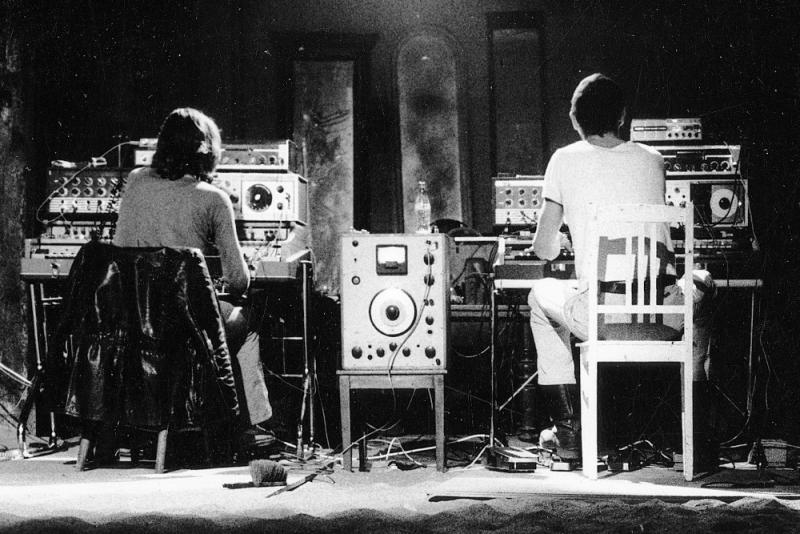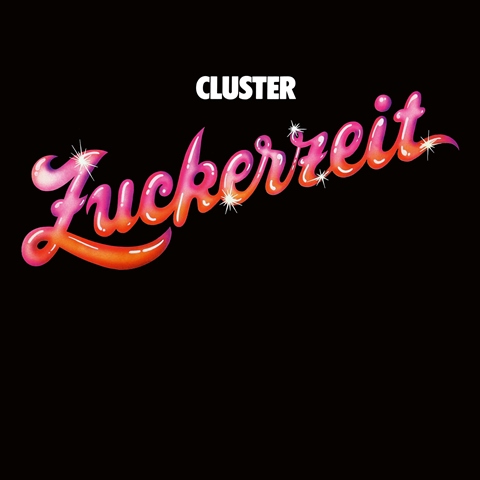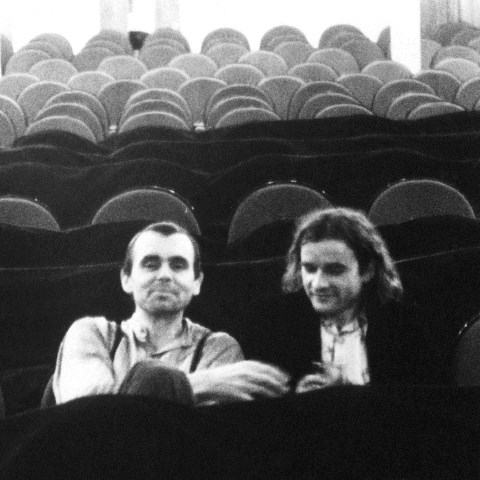Music Reissues Weekly: Cluster - Zuckerzeit | reviews, news & interviews
Music Reissues Weekly: Cluster - Zuckerzeit
Music Reissues Weekly: Cluster - Zuckerzeit
50th-anniversary nod to when Krautrock began embracing melody

In 1974, two albums by German kosmiche musicians working with electronics became the first from the seedbed of what’d been dubbed Krautrock to explicitly embrace – and merge – melody and rhythmic structure. One was Kraftwerk’s Autobahn. The other was Cluster’s Zuckerzeit. Once on the record player, each LP instantly made its presence felt more directly than anything either had released previously.
For Kraftwerk, this resulted in an unlikely international hit with a single edit of Autobahn’s title track. For Cluster, there were no singles and, consequently, no chance to fluke any chart action.
 Both Cluster and Kraftwerk were already heading towards a more straightforward music, where their free-form edges were toned down. Autobahn’s processor album Ralf & Florian included “Elektrisches Roulette,” “Tanzmusik” and “Ananas Symphonie,” all of which were friendlier to the ear than what they’d been up to beforehand. Dieter Moebius and Hans-Joachim Roedelius – who were Cluster – had previously explored some of the territory mapped out on Zuckerzeit when they recorded as Harmonia with Neu! guitarist Michael Rother – credited as Zuckerzeit’s producer: the credit was because he had loaned equipment to Moebius and Roedelius for the January 1974 recording of what became Zuckerzeit.
Both Cluster and Kraftwerk were already heading towards a more straightforward music, where their free-form edges were toned down. Autobahn’s processor album Ralf & Florian included “Elektrisches Roulette,” “Tanzmusik” and “Ananas Symphonie,” all of which were friendlier to the ear than what they’d been up to beforehand. Dieter Moebius and Hans-Joachim Roedelius – who were Cluster – had previously explored some of the territory mapped out on Zuckerzeit when they recorded as Harmonia with Neu! guitarist Michael Rother – credited as Zuckerzeit’s producer: the credit was because he had loaned equipment to Moebius and Roedelius for the January 1974 recording of what became Zuckerzeit.
Zuckerzeit is newly reissued on vinyl to mark its 50th anniversary. The telling title telegraphs the (relative) sweetness of what's in its grooves. It translates as “sugar time” or “sugar era.” Five of the album’s tracks are by Moebius, five by Roedelius. Though it has a unified feel, it brackets together the work of two individuals under one heading. The album opens with Roedelius’ “Hollywood,” a bubbling confection where swooping sounds complement rhythmic synth lines and a minimal drum machine. Next up, Moebius’ "Caramel" – similar, but melodically darker and more about the strict rhythm than the preceding cut. On it goes, each ensuing track a wonder.
Earlier, Cluster had been based in Berlin. Zuckerzeit, Cluster’s last record for the Brain label, was the first they completed in Forst, in the Lower Saxony countryside between Bremen and Hanover. This relocation from the urban to the bucolic might, in part, explain the lighter tone of the album in comparison to what came earlier, but the progression from Musik von Harmonia is clear. Another element which may have impacted on the relative reductiveness is the choice to use primitive drum machines and their pre-set rhythms: these did not lend themselves to a hard, or heavy, music.
 It’s fair to assume that in 1973 and 1974 predictions that Cluster (and Kraftwerk) would streamline their music were limited. There was one acknowledged watcher though: Brian Eno. Musik von Harmonia, issued before Zuckerzeit in 1974, clearly impacted on Eno’s 1975 album Another Green World. The connection was made explicit in 1977, when the collaborative Cluster & Eno album appeared. After The Heat, credited to Eno Moebius Roedelius, followed in 1978. They may not have become as high profile as Kraftwerk, but Cluster were making waves (pictured left: Dieter Moebius, left, and Hans-Joachim Roedelius, right, who were Cluster)
It’s fair to assume that in 1973 and 1974 predictions that Cluster (and Kraftwerk) would streamline their music were limited. There was one acknowledged watcher though: Brian Eno. Musik von Harmonia, issued before Zuckerzeit in 1974, clearly impacted on Eno’s 1975 album Another Green World. The connection was made explicit in 1977, when the collaborative Cluster & Eno album appeared. After The Heat, credited to Eno Moebius Roedelius, followed in 1978. They may not have become as high profile as Kraftwerk, but Cluster were making waves (pictured left: Dieter Moebius, left, and Hans-Joachim Roedelius, right, who were Cluster)
Beyond Eno, at this remove it’s not possible to determine who else was paying close attention. Whether it’s direct or indirect, the approach and feel of Zuckerzeit ripples through the DIY electronics of Daniel Miller’s 1978 "T.V.O.D.” / “Warm Leatherette" single as The Normal. John Foxx’s 1980 first solo album Metamatic and its attendant singles also exhibit reverberations of Zuckerzeit. The poppier side of the Cluster album is detectible in the very early Depeche Mode too.
After Zuckerzeit Cluster’s next LP, their first for the Sky label, was 1976’s more pastoral, more ambient-leaning Sowiesoso. It is Zuckerzeit, though, which resonates most. There was, it turned out, no need for a hit single.
- Next week: Angelic Upstarts’ bracing 1979 debut album, Teenage Warning
- More reissue reviews on theartsdesk
- Kieron Tyler’s website
Explore topics
Share this article
The future of Arts Journalism
You can stop theartsdesk.com closing!
We urgently need financing to survive. Our fundraising drive has thus far raised £49,000 but we need to reach £100,000 or we will be forced to close. Please contribute here: https://gofund.me/c3f6033d
And if you can forward this information to anyone who might assist, we’d be grateful.

Subscribe to theartsdesk.com
Thank you for continuing to read our work on theartsdesk.com. For unlimited access to every article in its entirety, including our archive of more than 15,000 pieces, we're asking for £5 per month or £40 per year. We feel it's a very good deal, and hope you do too.
To take a subscription now simply click here.
And if you're looking for that extra gift for a friend or family member, why not treat them to a theartsdesk.com gift subscription?
more New music
 Trio da Kali, Milton Court review - Mali masters make the ancient new
Three supreme musicians from Bamako in transcendent mood
Trio da Kali, Milton Court review - Mali masters make the ancient new
Three supreme musicians from Bamako in transcendent mood
 Hollie Cook's 'Shy Girl' isn't heavyweight but has a summery reggae lilt
Tropical-tinted downtempo pop that's likeable if uneventful
Hollie Cook's 'Shy Girl' isn't heavyweight but has a summery reggae lilt
Tropical-tinted downtempo pop that's likeable if uneventful
 Pop Will Eat Itself's 'Delete Everything' is noisy but patchy
Despite unlovely production, the Eighties/Nineties unit retain rowdy ebullience
Pop Will Eat Itself's 'Delete Everything' is noisy but patchy
Despite unlovely production, the Eighties/Nineties unit retain rowdy ebullience
 Music Reissues Weekly: The Earlies - These Were The Earlies
Lancashire and Texas unite to fashion a 2004 landmark of modern psychedelia
Music Reissues Weekly: The Earlies - These Were The Earlies
Lancashire and Texas unite to fashion a 2004 landmark of modern psychedelia
 Odd times and clunking lines in 'The Life of a Showgirl' for Taylor Swift
A record this weird should be more interesting, surely
Odd times and clunking lines in 'The Life of a Showgirl' for Taylor Swift
A record this weird should be more interesting, surely
 Waylon Jennings' 'Songbird' raises this country great from the grave
The first of a trove of posthumous recordings from the 1970s and early 1980s
Waylon Jennings' 'Songbird' raises this country great from the grave
The first of a trove of posthumous recordings from the 1970s and early 1980s
 Lady Gaga, The Mayhem Ball, O2 review - epic, eye-boggling and full of spirit
One of the year's most anticipated tours lives up to the hype
Lady Gaga, The Mayhem Ball, O2 review - epic, eye-boggling and full of spirit
One of the year's most anticipated tours lives up to the hype
 Slovenian avant-folk outfit Širom’s 'In the Wind of Night, Hard-Fallen Incantations Whisper' opens the door to inner space
Unconventional folk-based music which sounds like nothing else
Slovenian avant-folk outfit Širom’s 'In the Wind of Night, Hard-Fallen Incantations Whisper' opens the door to inner space
Unconventional folk-based music which sounds like nothing else
 'The Art of Loving': Olivia Dean's vulnerable and intimate second album
Neo soul Londoner's new release outgrows her debut
'The Art of Loving': Olivia Dean's vulnerable and intimate second album
Neo soul Londoner's new release outgrows her debut
 Music Reissues Weekly: The Peanut Butter Conspiracy - The Most Up Till Now
Definitive box-set celebration of the Sixties California hippie-pop band
Music Reissues Weekly: The Peanut Butter Conspiracy - The Most Up Till Now
Definitive box-set celebration of the Sixties California hippie-pop band
 Doja Cat's 'Vie' starts well but soon tails off
While it contains a few goodies, much of the US star's latest album lacks oomph
Doja Cat's 'Vie' starts well but soon tails off
While it contains a few goodies, much of the US star's latest album lacks oomph

Add comment